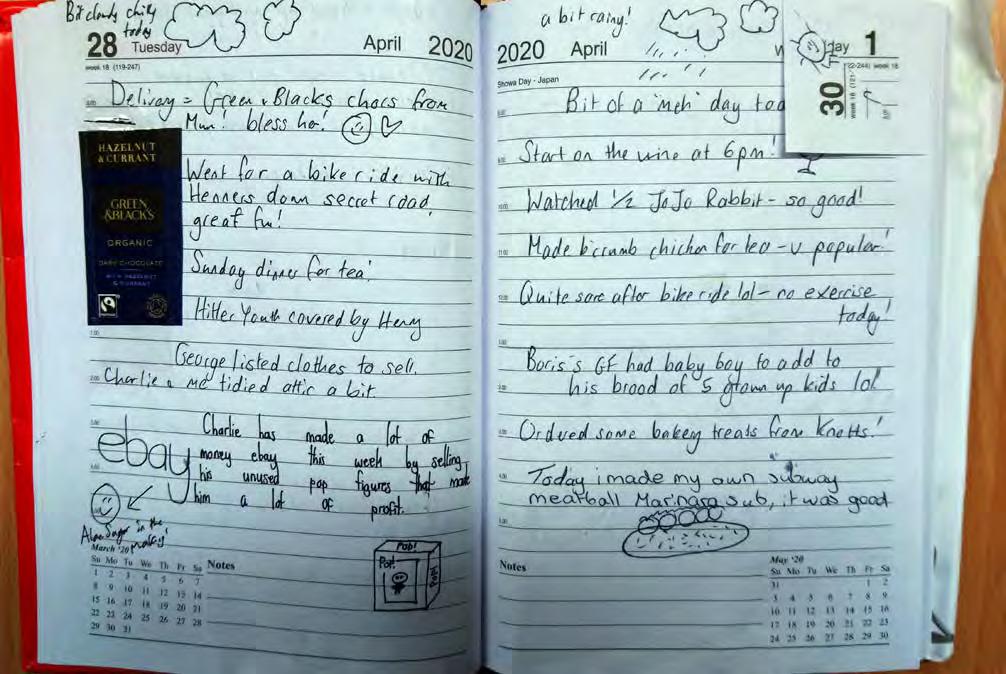
19 minute read
Museums in a time of change/crisis (delete where appropriate)
from Museum Ireland, Vol. 27. Widdis, B. (Ed.). Irish Museums Association, Dublin (2021)
by irishmuseums
MUSEUM IRELAND 2020
Museums in a time of change/crisis (delete where appropriate)
Advertisement
William Blair
I’m convinced that the pandemic we’re currently living through is both a manifestation of and a mere interruption in the relentless march towards an interconnected world, one in which peoples and cultures can’t help but collide. In that world – of global supply chains, instantaneous capital transfers, social media, transnational terrorist networks, climate change, mass migration, and ever-increasing complexity – we will learn to live together, cooperate with one another, and recognise the dignity of others, or we will perish.
Barack Obama, A Promised Land, 2020
Museums are facing unprecedented challenges in a rapidly changing world. The Irish Museums Association has endeavoured not only to keep pace with these changes, but also to show leadership in debating their implications and navigating a sustainable, relevant future. Now rapid social, economic and political change are accompanied by the impact of a global pandemic. As the sector begins to emerge from what has been the most significant crisis we’ve ever faced, will our postCOVID-19 world be one of bleak austerity, or an opportunity for museums to find a new fulfilment of their role and purpose in society?
When I took on the role of Chair of the Irish Museums Association in 2017, it coincided with my appointment as Director of Collections at National Museums NI. Inevitably, my reflections on the last three years are largely grounded in the transformation agenda within National Museums NI, and my own role in it. That said, it has also been an iterative process. The benefits of being active within a professional body like the Irish Museums Association include the opportunities it offers not only to use one’s own influence but also, just as importantly, to benefit from the influence of others. We are all on a learning journey and we all need critical friends to develop our own theory and practice.
I took on my current role as Director of Collections as part of a new leadership team. We had, like most in the sector, experienced years of cuts as a result of ‘austerity’ measures impacting public finances. But yet, despite these challenges, I looked forward to the future with confidence and optimism. If I was to summarise my dominant considerations over the past three years, they would be ‘role and purpose’, ‘values’, ‘ethics, and unlocking the potential of our collections. In good times and in bad times, values and ethics provide the essential touch point around which judgement can be exercised and decisions taken. For most of my career, values and ethics provided a passive background for my work; now they are my essential pole star.
It seems incredible to think that in his 1992 book, The End of History and the Last Man, Francis Fukuyama argued that the worldwide spread of liberal democracies and free-market capitalism of the West and its lifestyle may signal the end-point of humanity’s sociocultural evolution, and become
Lockdown diary: Jeanette Lunn from the EastSide Partnership group kept a diary of her lockdown experiences, recording her shopping and deliveries, home schooling with her children, craft activities, walks and many other day-to-day events and encounters. She has captured what life was like during the pandemic and this will provide a lasting and valuable record.
Credit: National Museums NI
the final form of human government. Instead, since then, we seem to have been subjected to the worst of history’s back catalogue – repackaged for new generations of extremists to consume via social media. (Some, of course, might argue that this is a by-product of free market capitalism.). This new extremism has been accompanied by broader coarsening and polarisation within public and political discourse. Tempers have frayed as the result of the racial injustice highlighted by Black Lives Matter and the fractious debates around ‘Brexit’.
History has always been ‘political’, but recently we have witnessed a more aggressive politicisation that goes beyond the conventional debates around historical method, sources and ‘conscious’ and ‘unconscious’ bias. History has now become weaponised and instrumentalised to serve identity politics both right and left. Trump’s America provided an extreme version of this – a glimpse of a dystopian reality where truth is denounced as ‘fake’, where wild conspiracy theories are embraced if they happen to align with individual preferences and prejudices, and where ‘the other’ is demonised in a manner reminiscent of twentieth century fascism. Whilst undeniably complex, ‘neutrality’ on these societal issues is not an option for museums. As a sector – one in which a common liberal DNA is shared - we are presented with a challenge to be courageous and an opportunity to find our voice. We somehow need to blend careful consideration with a readiness to innovate.
The main catalyst for creative thinking and debate within the Irish Museums Association is our annual conference, so in reflecting on the past three years, I see the themes of our last three conferences as a conceptually integrated triptych. In 2018, our annual conference considered the theme of ‘Collecting the Now’. It considered the question:
Do we have the objectivity to identify and select the items which will define our society for future generations? … We live in a period of unparalleled human consumption making the decision about
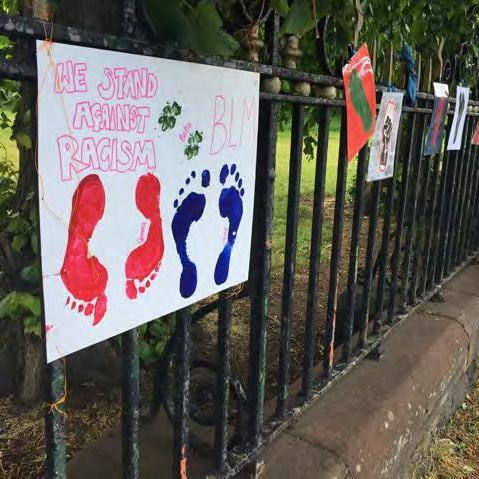
Posters displayed by local residents on the railings of Ormeau Park, Belfast to show their support for the Black Lives Matter movement.
Credit: National Museums NI
what to preserve in institutions, but this is not always reflected in their collections and the way they collect.
1
Collecting the ‘Now’ examined how museums can ensure that their collections capture contemporary cultural changes, diverse voices and shifting perspectives, moving on in some cases from the collected object. Its aim was to explore new, conceptual, collaborative and participatory ways to collect, which will produce more imaginative and diverse museum collections and exhibitions for the future. This certainly reflected my own preoccupations as we were in the middle of a major new collecting initiative ‘Collecting the Troubles and Beyond’, which has underpinned the development of a new ‘Troubles’ gallery at the Ulster Museum.
The importance of enabling multiple perspectives to be heard is a crucial ethical principle. It has guided National Museums NI’s work in recent years on the conflict commonly referred to as ‘the Troubles’. The same underlying principle can be seen in a very different form (and on a much larger scale) in a recent initiative in Germany, ‘Germany Talks’. This has sought to open up a national debate on issues currently polarising German society by encouraging people, often with radically different views, to engage with each other in conversation.2
But where do we draw the boundaries on ‘narrative hospitality’ and ‘radical multi-perspectivity’? An obvious limit is racist or sectarian views, or anything that promotes extremism or hate. Or should extreme views be allowed into museums where they can then be properly challenged? The thought makes me nervous, and I don’t have an answer; but we should certainly not remove views that simply fall outside the liberal consensus and thus become our own censors. I’m confident that the way forward in this will be found through courageous contemporary collecting, accompanied by courageous interpretation and display. National Museums NI’s ethics policy states:
National Museums NI recognises its museums are safe, shared spaces for everyone. For this reason, we will support freedom of speech and provide forums for the respectful sharing of different views and perspectives. Exceptions will be the sharing of views and perspectives that are sectarian, racist, sexist, ageist, ableist or homophobic. Where our collections demonstrate such views and perspectives, we will ensure we curate them in a sensitive and informative manner, providing context and seeking the input of communities. 3
The debate about history (‘whose history’) is being played out against a background of accelerating environmental degradation and a climate crisis of our very own making. What does this mean for our own institutions? Can we become exemplars in sustainable development? It should certainly be our aspiration. The environmental agenda and sustainable development, as reflected in the Sustainable Developments Goals adopted by the United Nations in 2015, provide an important framework to consider both environmental and human rights, along with a powerful spur for local action in support of a global agenda. They also provide a new framework to re-assess the value and importance of the ‘big data’ reflected in natural sciences collections and the landscapes and biodiversity of our sites.
Collections must never be considered immutable - they must evolve and change over time. And
Credit: National Museums NI

this means an open and informed attitude to disposal, particularly when it means transfer or repatriation. ‘Decolonising the Museum’ has emerged as a key agenda for museums and whilst the term itself is still the subject of debate, there is emerging consensus on the following:
• It is imperative that museums take a proactive stance on ‘decolonisation’. • Museums can and should be held accountable on matters of colonial legacies. • The decolonisation of museums can and should be enacted in many areas of our work, including research, interpretation, acquisitions, documentation, training, recruitment, partnerships, engagement, repatriation, and restitution. • Museums are not neutral spaces. Debates in the museum sector have moved on from querying whether museums are neutral, and instead now centre on what it actually means to not be neutral. It is not about taking sides in party politics, but rather recognising that we have a responsibility to take positive action against prejudice, discrimination, and exclusionary practices.
The collections we hold, particularly our World Cultures collections, require a fundamental re-think. Ethnology has generally been the main focus of this renewed scrutiny, often with its roots in imperial expansion, colonialism and sometimes the violence and appropriation associated with conquest and subjugation. Whilst this is often the case, a distinction must also be drawn between colonialism and the history of globalisation and increased travel and trade, although the latter is often underpinned by exploitation and asymmetrical relationships. The truth lies somewhere within the nexus of these processes and must also take account of the fact that while we can put history in the dock, it can usually muster a better defence than our choices and actions in the present. Is the world any less exploitative now than it was in the past? Is it any less unequal? Is it not still a world of empires masquerading as superpowers and trading blocs?
Rethinking World Cultures must mean more than an apologetic review of ‘ethnological collections’. To genuinely find meaning, relevancy and a new dynamism it must proactively explore global issues, global movements (like Black Lives Matter), and the promotion of mutual understanding and respect across cultures and societies. At the Ulster Museum, we are actively planning a new exhibition on ‘Rethinking World Cultures’ to begin this process, with the aim of creating a dynamic, evolving gallery in which we can explore new ways of working and new ways of thinking.
For museums across the island of Ireland, consideration must also be given to the particular context and sensitivities associated with colonialism in this place. Whilst there are undoubtedly conversations that need to happen across Ireland, we have to consider if

Climate change strike poster, Youth Climate Association NI. Campaigners have been pointing out for over a decade that NI is the only part of the UK and Ireland not to have enacted dedicated climate change legislation. In December 2020, NI government launched a consultation on policy options for a Climate Change Bill.
Credit: Youth Climate Action NI
this is best conducted within the framework of decolonisation. A useful guide is to consider if and how we feel British identity has quashed and/ or demoted Irish identity and experiences in our museums in the year 2021. Are British voices speaking on behalf of those who are Irish, without their consent or input? In Northern Ireland in particular, concepts of ‘British’ and ‘Irish’ must be explored and considered thoughtfully, given the cross-fertilisation of culture and cultural fusion that underpins our society today. Is it helpful in Northern Ireland to frame cultural diversity in terms of colonisers and colonised? What are the implications of this when it comes to understanding conflict, dealing with the legacy of the past and building social cohesion? It is wholly appropriate to critically evaluate legacies of colonialism and imperialism – especially since those legacies have seldom been properly debated or are, more often, simply hiding in plain sight. However, surely all the major ‘isms’ in history must be constantly evaluated? The exclusionary nature of nationalism provides its own particular challenges in the present. The legacy of partition and the current uncertainty about our political futures lends additional urgency to this. To live in Ireland and have your roots in Ireland, yet feel excluded from the Irish nation, can be politically and culturally disorientating. For someone with my cultural background, it is never a case of ‘Irish’ versus ‘British’ but rather Irish and British. And the question of where one identity begins and another ends is a false dichotomy. That said, I’m sure this sense of dual identity is one that is shared by many other ethnic minorities on the island, whether their journey began as economic migrants in the seventeenth century or the twenty first century. But is this just semantics: what’s in a name? Quite a lot actually, especially when the terms are ‘colonist’, ‘settler’, ‘migrant’, ‘native’, ‘indigenous’ or ‘citizen’.
In considering these issues, museums must support exploration and public discourse in a way that moves beyond old historical tropes/binaries, and instead challenge stereotypical views of

Baobab nut from the Australian collections at the Ulster Museum. National Museums NI is pleased to be in dialogue with the Australian Institute of Aboriginal and Torres Strait Islander Studies about these collections.
Credit: National Museums NI
history. Comfortable simplistic narratives need to be constructively disrupted. In looking at issues relating to culture, identity and the legacy of the past within our own communities and experiences, we must be careful not to undermine the core principle of decolonisation, which is to address racism and exclusionary practices, by letting it be hijacked by narrow political agendas.
In 2019, the Irish Museums Association’s conference considered the theme ‘We are all Engagers’:
Museums are rising to the challenges of increasing and diversifying their audiences and are enthusiastic in their commitment to playing an active role in improving lives and creating a better society. However the ‘relevance’ of the museum is still mostly discussed in relation to sustaining and increasing audiences and social contribution, yet not posing the question of how we can ensure these changing values and aims are embedded in the core of the museum.4
We are all Engagers considered how museums can imbue audience-centred thinking within their organisational culture, and in particular, how we develop and reimagine collections in ways which will actively engage the public: ‘How can we unlock our full potential by becoming more dynamic, agile, and responsive to issues of contemporary relevance?’ The fundamental question that museums have to address is who’s not coming through our doors, or participating, and why? Competition for public interest and attention is far more than other museums or other organisations in the wider cultural sector. It’s all the other life choices that people make that reflect their interests and values. In truth, we share many of those interests and concerns, but that’s not necessarily how we’re perceived. Breaking through this perception of irrelevance requires a radical shift on our part. These questions now have an even greater urgency as we seek to understand the impact and legacy of the current global pandemic.
In that context, to equip ourselves for this challenge, we must scan the horizon and identify discernable societal and global change. In developing National Museums NI’s ‘Manifesto for Change’ for the Ulster Folk Museum at Cultra, we have highlighted four trends:5
• Trend 1: Identity & Inclusion
People across the world are challenging the status quo, moving away from the rigid definitions of race, gender, and sexuality in search for a more self-defined approach to identity. Generation Z, in particular, is leading the charge in changing how they see themselves, their actions and the world. The rights and wellbeing of the individual within all spheres of society is taking concrete form across the globe. However, the search for identity is
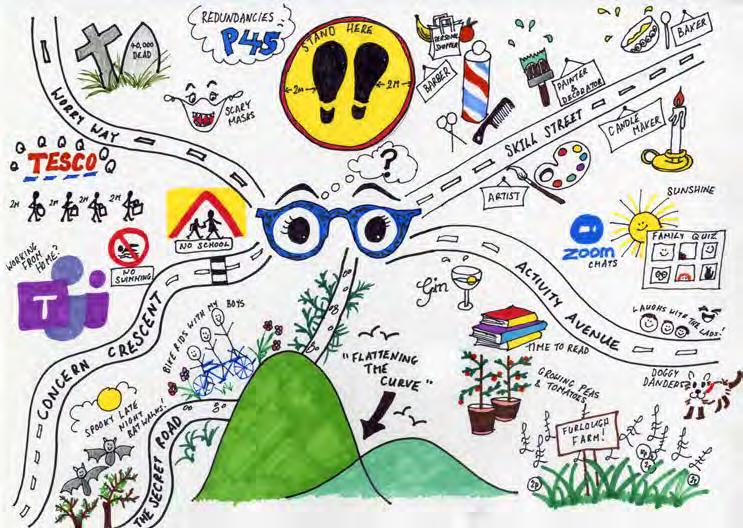
The EastSide Partnership group in Belfast recorded their experiences of lockdown and a public health crisis in the form of mind maps.
Credit: National Museums NI
intricately linked with the pursuit of meaning. In a digital society, more than one in three people globally feel that the way they live their lives has become meaningless. There is a sense that the local culture, values and traditions - which make up so much of our identity – are becoming lost. More than half of people globally feel more of a ‘citizen of the world’ than a citizen of their country.
• Trend 2: Environmental Activism
Heatwaves, forest fires and extreme weather; school strikes organised by Greta Thunberg; and news that the Arctic permafrost is thawing decades earlier than predicted. These are just some of the reasons why 80% globally think we are heading for environmental disaster unless we change our habits quickly, a view steadily on the rise since 2013. The conversation has shifted from climate change to climate emergency, and this trend unites most people in a way little else does. People are also becoming more active in scrutinising what governments and organisations are or are not doing to actively repair our fragile planet. People are increasingly more aware and educated and
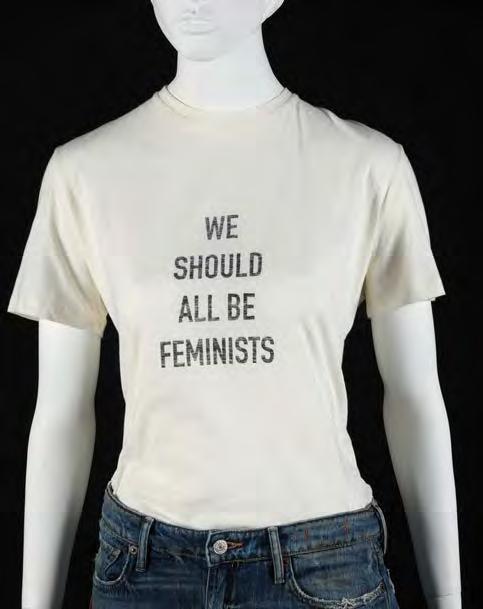
‘We should all be Feminists’ T-Shirt, Maria Chiuri Grazia, Dior.
Credit: National Museums NI
• Trend 3: Proudly Local, Quietly Nostalgic
Taking pride in and supporting local communities is an enduring feature of the consumer landscape. Consumers are retreating from globalisation and hyper-consumption and valuing local authenticity and provenance, with 70% more likely to buy products that are locally grown than those that are grown elsewhere.
However, there are also deeper ethical value shifts beyond self-expression and consumption driving this desire for localisation. On a more personal and subconscious level, the trend also reflects a fear of the future and a sense of being overwhelmed by the pace of modern society which is causing a desire for roots, traditions and nostalgia. Globally, 63% of us wish our lives were simpler, and more than three in five wish we could slow down the pace of our lives.
• Trend 4: Anxiety & Alienation
Pessimism is increasingly common. The most recent Gallup Survey, covering 140 countries in 2019, reported a global feeling of anxiety, sadness and anger shared around the world. The paradox is striking. Urbanisation has brought more people together than ever, but loneliness is more likely to be felt within big cities. People are more connected today than ever before, but feelings of loneliness and isolation are on the rise and will reach epidemic proportions by 2030. People are replacing emotional connections with digital ones and losing the sensation of being present and feeling alive.
Whatever the future holds, mental health issues – such as anxiety and alienation – seem likely to remain a problem for society to grapple with. The technology may be new, but the need for human beings to have real and genuine connections is as old as time.
In considering all of this, the fundamental challenge then is how to transform our museums, which was the theme of the Irish Museums Association’s conference in 2020. In recent decades, there has been a major shift towards a user-led philosophy within museum practice. The question asked through ‘Transforming Museums’ was:
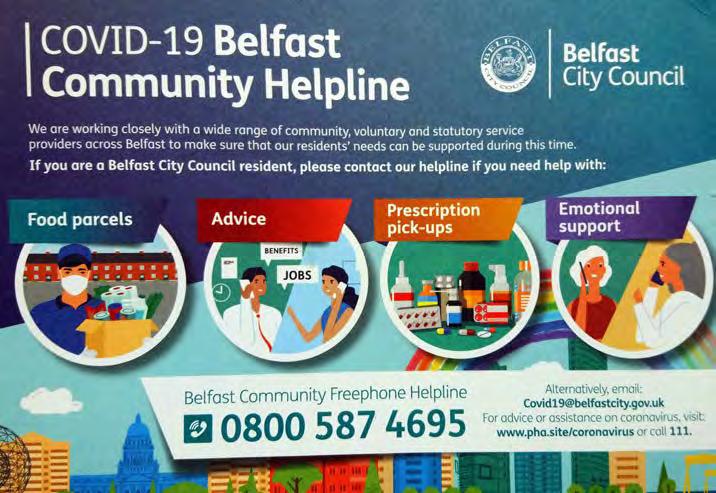
Community leaflet: As the elderly and clinically vulnerable were required to self-isolate or shield themselves from the pandemic, and many others struggled with the financial implications, community initiatives emerged to provide practical and emotional support.
Credit: National Museums NI
How can we encourage and drive this culture change from within our institutions, and also adapt to the changing cultural context in which our institutions exist? Is it time to reimagine the place of the museum and its functions and who will shape that vision? More than ever, museums are directly engaging with topics of social change. Does this signal a shift in museums’ identities and roles? … By exploring what museums can be and what are the barriers to us achieving this, we pose the question: as we look towards ‘Ireland 2040’ what will the museums of twenty years from now look like? 6 than three years ago. That said, not all will survive and thrive. Those who do will have used their own agency and core commitment to humanitarian and environmental causes to negotiate a successful future. At their best, museums can be a rich source of identity, meaning and authenticity for everyone. They can be champions of the environment, sustainability, and biodiversity. They can be an escape from modern society, where people feel connected with place. And they can be places where people and communities come together to connect with the things that matter.
Complacency has always been the greatest risk to museums; a sense of entitlement born from a belief that the collections and knowledge we hold in themselves offer protection from a hostile world. However, that’s a very risky assumption to make. We all operate within a wider context of accountability and if that means government, whether local or central, that means delivering against outcomes. Framing our value to society in terms of outcomes makes what we do meaningful and comprehensible to our key stakeholders. It might mean investing in a new language Application, but more fundamentally it means continuing to reset our museums from being internally focused (as they were in the past) to being externally focused and embracing the full measure of culture change that comes with that.
Ironically, despite the twin challenges of profound social change and a global public health crisis, I am more confident about the future of museums now
William Blair is Director of Collections at National Museums NI and a former Chair of the Irish Museums Association (2016-2020).
Notes
1. ‘Collecting the ‘Now’’, Irish Museums Association, 2018,
http://irishmuseums-annualconference2018.weebly.com/.
2. Shan Wang, ‘In Germany, a News Site Is Pairing up
Liberals and Conservatives and Actually Getting Them to
(Gasp) Have a Civil Conversation’, NiemenLab, 8 August
2018, https://www.niemanlab.org/2018/08/in-germany-
a-news-site-is-pairing-up-liberals-and-conservatives-
and-actually-getting-them-to-gasp-have-a-civil-
conversation/
3. National Museums NI Ethics Policy (Cultra: National
Museums NI, 2020), https://www.nmni.com/Corporate-
information/Corporate-documents/Policies-and-
4. 2019 Irish Museums Association Conference: We Are All Engagers (Irish Museums Association, 2019), https://
irishmuseums.org/annual-conference/2019-irish-
museums-association-annual-conference.
5. Analysis is based on review of research sources
including: Top 10 Global Consumer Trends 2020 (Euromonitor
International, 2020), https://go.euromonitor.com/white-
paper-EC-2020-Top-10-Global-Consumer-Trends.html;
Ipsos Global Trends 2020 (Ipsos, 2020), Ipsos Global Trends
2020: Understanding Complexity | Global Trends 2020;
Global Consumer Trends 2030 (Mintel, 2020), https://www.
mintel.com/global-consumer-trends-2030; Northern Ireland Life and Times Survey 2018 (ARK, 2018), https://www.
ark.ac.uk/nilt/2018/.
6. 2020 Irish Museums Association Conference: Transforming Museums, (Irish Museums Association, 2020), https://
irishmuseums.org/annual-conference/2020-ima-annual-
conference.









